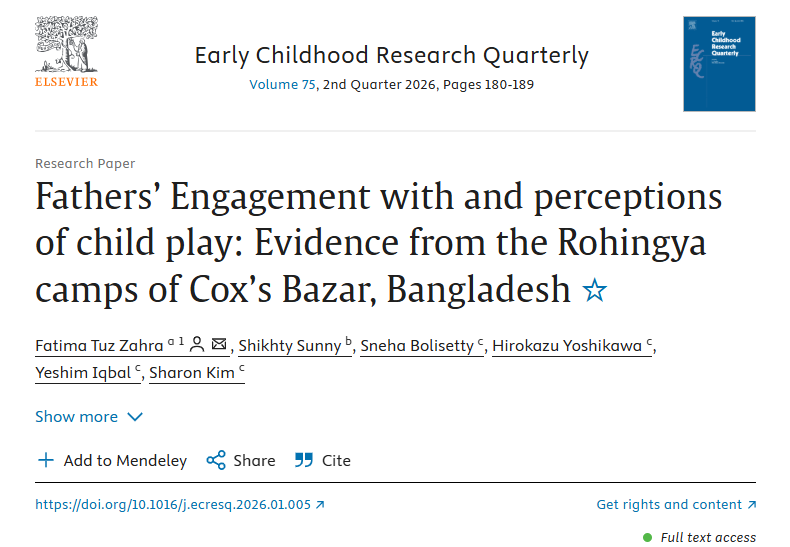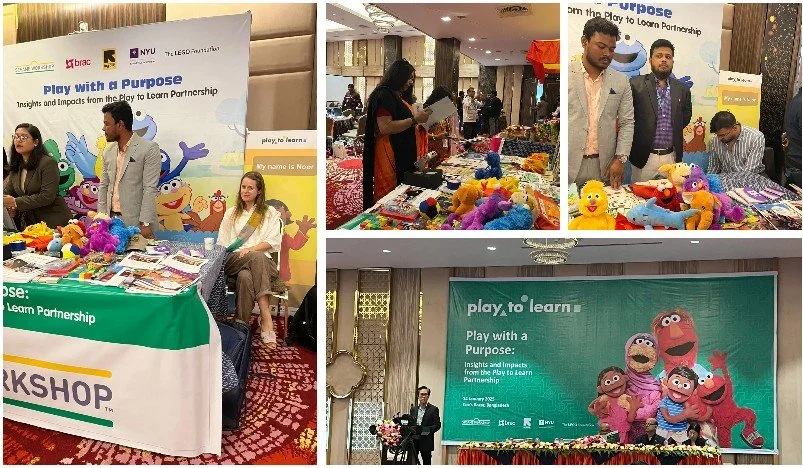Play to Learn
[2018-2025]
Project Overview
Play to Learn was an innovative program from Global TIES for Children, the LEGO Foundation, Sesame Workshop, BRAC and, the International Rescue Committee that harnessed the power of play to deliver critical early learning opportunities to children and caregivers affected by conflict and crisis. The project reached families affected by the Rohingya, Syrian, and Venezuelan refugee crises through educational media and direct services in homes and play spaces to provide the essential building blocks of play-based learning and nurturing care. Ultimately, Play to Learn aimed to establish play-based early childhood development as an essential component in humanitarian responses for all children and caregivers affected by crisis.
-
The Play to Learn program launched in 2019, about two years after the influx of over 740,000 Rohingya fleeing Myanmar into Cox’s Bazar. We worked with partners to implement and study early childhood development (ECD) programs that targeted both children and caregivers in the Rohingya refugee camps in Bangladesh, parts of Colombia that host Venezuelan refugees, and parts of the Middle East affected by the Syrian refugee crisis. A priority of this work was to add to the extremely limited evidence base about what types of ECD programs work, and why and for whom, in humanitarian contexts.
-
Global TIES for Children aimed to fill significant gaps in the evidence base through our Play to Learn projects in the following ways:
To understand the range of cultural and contextual factors that are critical to understanding human development generally, and early childhood development specifically in relation to the Rohingya refugees living in Cox’s Bazar.
To develop ECD constructs and measures specific to child development, learning through play, and service/program quality to facilitate these outcomes in this population.
To conduct the first large-scale longitudinal study starting during the prenatal period to understand developmental trajectories and the powerful protective factors that may improve them in this unique cultural, linguistic and humanitarian context of the Rohingya camps in Cox’s Bazar. A large-scale prenatal birth cohort study has never been conducted in a humanitarian context characterized by extraordinary levels of exposure to stress, leaving a huge gap in the science and practice of early childhood development.
To evaluate child- and caregiver-focused innovative models in mass media and father and caregiver engagement, in the contexts of Bangladesh and Colombia.
-
Play to Learn comprised three programs of work:
Impact Evaluations
Our Play to Learn research included two impact evaluations of 1) a flexible, hybrid home-visiting program led by BRAC in Cox’s Bazar that seeks to engage fathers as well as mothers and 2) a mass media intervention developed by Sesame Workshop for both refugees and host communities affected by the Venezuelan refugee crisis in Barranquilla and surrounding areas of Atlántico, Colombia.
Longitudinal Study
In addition to these two impact evaluations, Global TIES for Children launched a longitudinal study starting in the prenatal period which follows very young Rohingya children through their first years of life. This study, which remains ongoing beyond the period of the Play to Learn project, aims to investigate, longitudinally, the potential lifespan developmental implications of being conceived, gestated, born, and raised in contexts of war and displacement. This study takes a bioecological approach and includes measures of neurobiological functioning, caregiver health and wellbeing, caregiving and parenting, and family, community, and cultural factors.
Processes, Measures, & Tools
The development and adaptation of culture-and-context-specific processes, measures, and tools was an important part of our work. Given significant delays to project timelines due to the COVID-19 pandemic, Global TIES for Children and partners were able to carry out multi-method analysis of data collected during previous pre-pilot and pilot activities. This analysis led us to a much more extensive and in-depth assessment of the cultural factors and resulting research learnings, including methods, about a refugee flow that is unprecedented in the combination of its size and the complete lack of ECD-focused research to date on the population. Much of this analysis was designed for internal use, as part of our efforts to develop, adapt, and refine measures to be culturally and contextually relevant for populations in the Cox’s Bazar Rohingya refugee camps, but a substantial portion of our findings are of relevance for other researchers, program implementers, and policymakers.
-
Intergenerational Risk and Resilience of Rohingya in Displacement (iRRRd) Study: Initially launched as part of the Play to Learn (PtL) research, NYU-TIES - in partnership with icddr,b and UCDavis - is conducting a longitudinal prenatal and early years cohorts study which follows caregivers and their young children from the Rohingya refugee and host communities in Cox’s Bazar, Bangladesh. The study starts in the prenatal period and continues through the first years of life. It aims to investigate, longitudinally, the potential lifespan health and developmental implications of being conceived, gestated, born, and raised in contexts of war and displacement.
Featured News & Publications
Partners & Funders
The Lego Foundation
Funder
Sesame Workshop
Partner
International Centre for Diarrhoeal Disease Research, Bangladesh
Partner
ARCED Foundation
Partner
Brac
Partner
Humanitarian Assistance Program
Partner
Innovation for Poverty Action (IPA)
Partner















